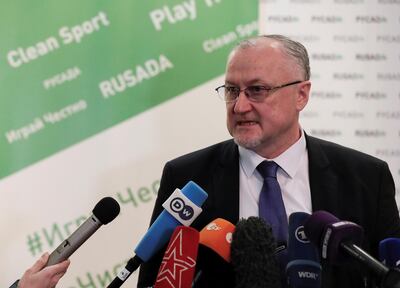The World Anti-Doping Agency (Wada) on Monday banned Russia from global sporting events including the 2020 Tokyo Olympics and the 2022 Beijing Winter Olympics after accusing Moscow of falsifying data from an anti-doping laboratory.
Wada's executive committee took the decision after it concluded that Moscow had tampered with laboratory data by planting fake evidence and deleting files linked to positive doping tests that could have helped identify drug cheats.
The committee's decision to punish Russia with the four year ban was unanimous, the spokesman said.
The country's president, Vladimir Putin, said on Monday that Moscow had grounds to appeal the decision by the World Anti-Doping Agency. He also said the move violated the Olympic charter.
Speaking in Paris after talks with his Ukrainian counterpart, Mr Putin said the move was a political one and he would examine the decision.
The Russian President at a news conference in the French presidency's Elysee Palace, said the WADA conclusions contained no complaints directed at Russia's national Olympic committee.
"And if there are no complaints against it, then the country should compete under the national flag. That's written in the Olympic charter. That means that, in that aspect, the WADA decision violated the Olympic charter. We have all grounds to appeal," Mr Putin said.
"Any punishment should be individual, and should be linked to what has been done ... by one person or another. A punishment cannot be collective, and apply to people who have nothing to do with certain violations," he added.
"If someone takes such a decision about collective punishment, I think there is every grounds to suppose that the basis for such decisions is not a care about the purity of international sport, but political considerations which have nothing to do with the interest of sport or the Olympic movement," Mr Putin said.
Russia, which has tried to showcase itself as a global sports power, has been embroiled in doping scandals since a 2015 report commissioned by the Wada found evidence of mass doping in Russian athletics.
Its doping woes have grown since, with many of its athletes sidelined from the past two Olympics and the country stripped of its flag altogether at last year's Pyeongchang Winter Games as punishment for state-sponsored doping cover-ups at the 2014 Sochi Games.
“Russia was afforded every opportunity to get its house in order … but it chose instead to continue in its stance of deception and denial,” Wada president Craig Reedie said.
Responding to the ban, Russian Prime Minister Dmitry Medvedev urged sports organisations to appeal and said the ruling was “a continuation of this anti-Russian hysteria which has already become chronic”.
But the head of Russia's anti-doping agency said his country had "no chance" of winning an appeal against a ban he said was a tragedy for clean athletes.
"There is no chance of winning this case in court," RUSADA chief Yury Ganus said after the ban was imposed.
The agency's supervisory board is set to meet on December 19 to take a decision on whether to appeal the ban, he said.
"This is a tragedy," he said.
"Clean athletes are seeing their rights limited."
Mr Ganus said that some Russian athletes were contemplating leaving Russia so that they could train elsewhere.
He described the sentiments among athletes as "awful," stressing that four years for a sportsman is a long time in what can be a short career.
Monday's sanctions had been recommended by Wada's compliance review committee in response to the doctored laboratory data provided by Moscow earlier this year.
One of the conditions for the reinstatement of RUSADA, which was suspended in 2015 in the wake of the athletics doping scandal but reinstated last year, had been that Moscow provide an authentic copy of the laboratory data.
The sanctions effectively strip the agency of its accreditation.
Sports Minister Pavel Kolobkov last month attributed the discrepancies in the laboratory data to technical issues.
The punishment, however, leaves the door open for clean Russian athletes to compete at major international sporting events without their flag or anthem for four years, as was the case during the 2018 Pyeongchang Olympics.
After the ban was announced, the heads of several Russian sports federations said they were preparing to send athletes to the 2020 Tokyo Olympics under a neutral flag.
The head of Russia's swimming federation, Vladimir Salnikov, said the country's athletes "must go to the Olympics whatever the situation".
"Of course we'd prefer that our athletes participate under the Russian flag and hear their national anthem. But the circumstances may be different... (and) no-one has the right to deprive innocent athletes of their dreams," he told state news agency RIA Novosti.
"If (participating under a neutral flag) is the only possibility, we must go and win. Our clean athletes, I am sure, will show that they are strong, even in these circumstances," said the head of the waterpolo, diving and synchronised swimming federation, Alexei Vlasenko.



